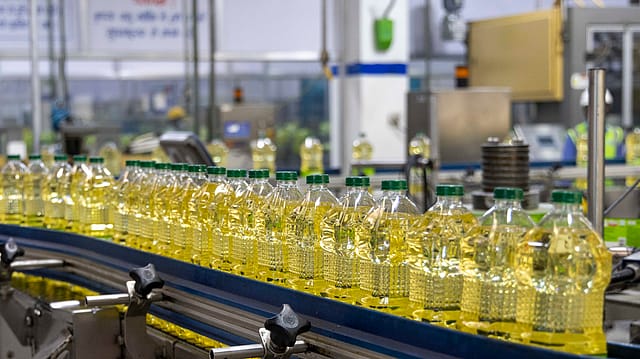Sufficient edible oil stock to face Indonesia's palm oil exports ban: Govt
ADVERTISEMENT

India has an optimum stock of all edible oils to cover the lean period due to Indonesia's ban on palm oil exports, the government says.
This comes days after Indonesia, the world's largest palm oil producer, announced a ban on palm oil exports to increase domestic availability and to control rising prices.
The government, citing industry sources, says the present stock of all edible oils in the country is around 21 lakh metric tonnes (LMT) and around 12 LMT is in transit arriving in May, 2022.
In an effort to provide relief to Indian consumers, the Department of Food and Public Distribution is monitoring the price and availability situation and meetings are held regularly with major edible oil processing associations to discuss further reduction in the domestic edible oil prices, the central government says in a release.
Palm oil — including crude and refined oil — constitutes roughly around 62% of the total edible oil imports in the country. It is imported mainly from Indonesia and Malaysia.
The government was banking on palm oil imports after shipments of sunflower oil — which comprises 15% of most Indian edible oil brands — were hit due to the Russia-Ukraine war. Ukraine and Russia together account for 90% of India's sunflower oil imports. Soybean oil, which comprises 22% of India's total edible oil imports, is bought mainly from Argentina and Brazil.
Fitch Group's India Ratings and Research (Ind-Ra) expects Indonesia's decision to include crude palm oil (CPO) in the scope of its export ban to hurt India, putting half of the country's palm oil supply under a cloud, while also increasing consumer inflation.
"High imports at a continued depreciating rupee will affect the landed prices of other edible oils," the rating agency says in a report.
"The move could remove about 2 million tonnes (mnt) of palm oil supply from the global market every month, which is nearly 50% of the global monthly trade volumes, leading to a rise in substitution demand for other oils and thus a widespread rise in edible oil prices," it adds.
Ind-Ra, however, believes that the ban is unlikely to sustain for a long duration, given that Indonesia consumes less than 40% of its total palm oil production, resulting in the impact being transitory.
Palm oil accounts for about 40% of the world’s edible oil consumption due to its low costs and its wide uses in food manufacturing, beauty products, biodiesel, etc., apart from direct consumption as edible oil. Indonesia accounts for around 60% of the global palm oil production and annual exports of around 27 million tonnes. While Malaysia, the second largest producer, that exported around 18 million tonnes of palm oil in 2020-21, could step-up supply a little, Ind-Ra believes the ramp-up would be limited considering the limited crop size in addition to labour availability issues.
International prices of edible oils are under pressure due to a shortfall in global production and increase in export levies by the exporting countries, the government says, adding that India is one of the largest producers of oilseeds in the world.
The country's oilseeds sector accounted for the estimated production of 37.14 million tonnes of nine cultivated oilseeds during the year 2021-22 as per the Second Advance Estimates released by the Department of Agriculture and Farmers Welfare.